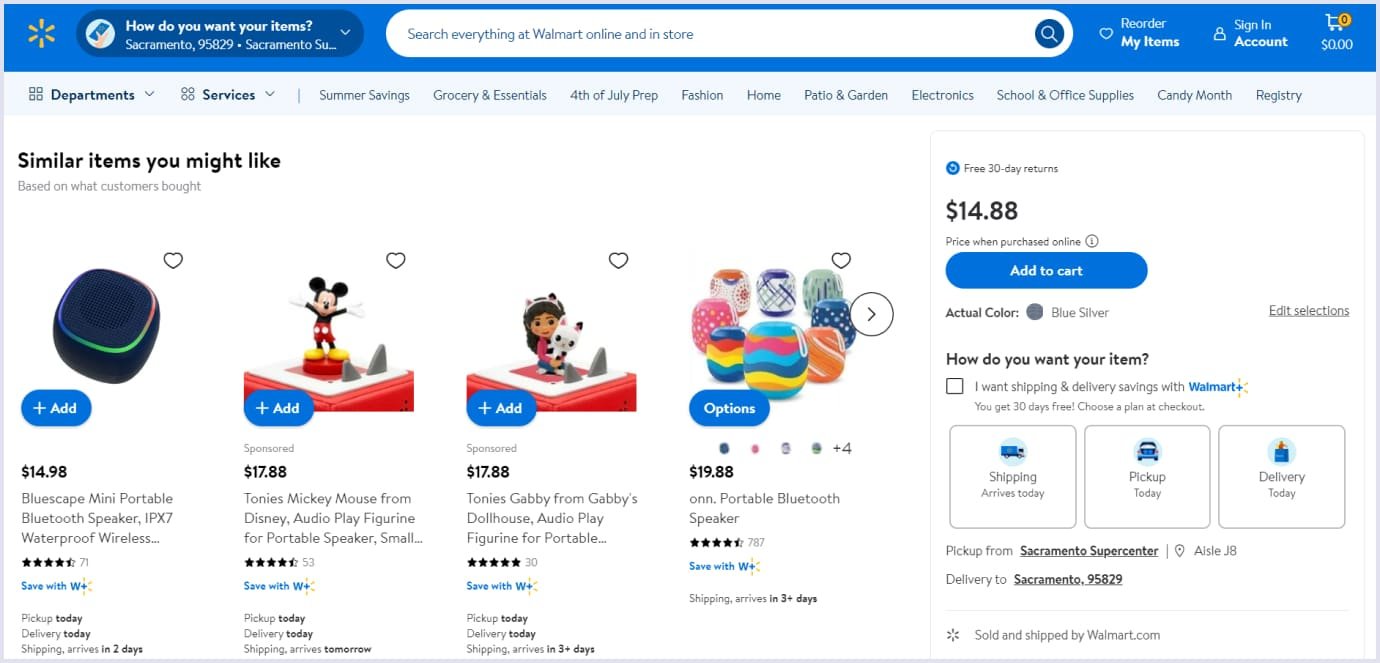The world of web-based business is undergoing a revolution, and one of the main drivers of this development today is artificial intelligence (AI). A couple of years ago, it seemed to be just a theory, but as of now, it is becoming an active AI marketplace development tool in e-commerce.
According to PwC, last year, more than 71% of leading retail brands fully or partially used AI technologies in their operations, and this percentage is only expected to increase significantly. This explosive development is due to machine learning algorithms, neural networks, and generative AI in ecommerce, allowing online retailers to effectively solve a range of tasks, including the following:
- marketing personalization;
- improving service and customer experience;
- supply chain optimization;
- demand forecasting;
- dynamic pricing;
- deep automation of operations;
- ensuring cybersecurity and data protection.
AI solutions for e-commerce are capable of taking over various aspects of an online store, aimed at improving communication with visitors, technical and search engine optimization, and increasing conversion rates. Unlike many other industries where mass adoption of AI is still associated with high risks and faces ethical concerns (finance, medicine, education, etc.), online retail can maximize the benefits of AI.
Seeing super successful retailers examples of AI in e-commerce applications by industry giants (e.g. eBay, Walmart, Amazon) and are looking to replicate their success on one scale or another:
Amazon
Amazon, the largest marketplace, uses artificial intelligence algorithms to detect fraud in its payment system, such as online payment and identity fraud, creation of fake accounts, misuse of loyalty accounts and promo codes, etc. Thus, AI protects the company from losses and reduces the need for manual monitoring.
Amazon customers can make voice payments using Amazon Echo and its integrated Alexa AI assistant. Amazon Web Services (AWS) has launched a series of products designed to help businesses develop their own chatbots and artificial intelligence-based imaging services.
eBay
This online outlet uses artificial intelligence to provide custom marketplace development advice and recommendations, improve shipping times, pricing, trust between buyer and seller, and more. This technology is also utilized in domains like eBay's image search functionality and automated webpage translation. In 2019, the online marketplace claimed to have detected 40% of online credit card fraud with "high accuracy" using AI.
Walmart
It is one of the largest retailers in the world. Walmart uses robots to scan the shelves in dozens of its stores for missing items or price tags that need to be changed. For example, machines allow you to optimize the work of your staff, in particular, to permanently forget about the problem of expired products.
The case of Tommy Hilfiger is also a prime example of marketplace AI evolution. This well-known fashion brand decided to use AI to support the creative process. For this purpose, they attracted major partners: IBM and the Fashion Institute of Technology.
The role of AI in e-commerce will only increase - the rapid development of technology in this area will be superimposed on the huge demand. Together with Codica, you can bring this technological revolution to life and create your AI powered marketplace of the future by implementing advanced AI technologies.
Enhancing customer experience
Americans spend more than $1 trillion on online purchases of various everyday items (clothing, electronics, baby care, pet supplies, and more). AI-powered marketplace customer service for online retailers can positively impact all aspects of operations, from providing customers and operators with an exceptional user experience to organizing more cost-effective and efficient workflows.
Personalized recommendations
Personalization in the context of e-commerce is the process of customizing offers, products, and content to meet the individual needs of each shopper. This is achieved by artificial intelligence by analyzing data about users' actions, past purchases, and interactions to create a unique and personally customized shopping experience.
In a world where users are exposed to an overwhelming amount of advertising every day, it's hard to overstate the importance of personalization: not only does it increase customer satisfaction by enriching their interactions with a brand, but it also markedly increases conversion rates and sales. By applying personalization, companies can significantly increase the chances of repeat purchases, as offers that are precisely targeted to an individual's needs and interests are more effective.
The main benefits of AI-enabled personalization relate to:
- Increased conversions: Personalized content leads to a higher likelihood of conversion because it is more relevant to each user's needs and interests.
- Improved customer experience: Users appreciate a personalized experience, which improves overall brand perception.
- Reducing churn: Personalized content and ads help retain customers because they see more value in the services provided.
- Effective targeting: Using AI allows you to pinpoint what content will be most relevant to each audience segment.
Artificial intelligence not only increases the effectiveness of online marketing but also makes the interaction with the audience more meaningful and satisfying for all parties.
Improved search functionality
AI tools for e-commerce can significantly optimize the process of finding the right products and sections on sites based on a particular user's previous search history as well as his/her product preferences.
AI was implemented in recommendations to understand what products a person does not need so as not to bother the user with ads. However, with the development of algorithms, it turned out that this tool is so well-versed in human needs that it can recommend products that the user will definitely buy. A recommended products section on a product page significantly influences a buyer's decision by offering alternatives. Recommendation technologies help users find products they might not have found otherwise.

Operational efficiency
Inventory management
"Out of stock": that's the phrase customers don't like to hear. Using artificial intelligence, a seller can more easily determine which items are likely to be out of stock and replenish them quickly.
Determining that an item is in high demand is easy enough: users will often search for it on the site. By analyzing search data, a company can find out which products are in demand at different times of the year, such as sneakers in the summer and boots in the winter. This information will be useful in planning product purchases so there is neither a shortage nor a surplus.
Here are a few of the striking benefits AI brings to retail inventory management:
- Optimized inventory: Predictive analytics helps prevent overstocking and stockouts.
- Accurate forecasting: Data analytics provides accurate demand forecasting to aid in planning.
- Waste reduction: Identifying slow-moving items minimizes waste and excess inventory.
- Efficient operations: Automating tasks such as re-sorting saves time and resources.
- Real-time information: Instant visibility into inventory levels helps you make quick decisions.
Thus, the concept of inventory management will help online businesses manage the planning of goods production and inventory. AI helps retailers monitor inventory levels, predict customer demand, and maintain optimal stock levels in real-time. This is good news because stores can save money, keep popular items in stock, and increase sales.
With AI, retailers get a partner who works tirelessly to improve inventory practices, ensuring efficient inventory levels, minimizing stock-outs, and maximizing profitability.
Dynamic pricing strategies
AI can be used as an effective tool for implementing dynamic pricing, as it allows companies to simultaneously take into account multiple aspects: user demand, competitors' offers, target audience needs, etc. By applying flexible pricing strategies, a company will be able to adjust prices depending on demand, competition, and other factors.
For example, some products people are willing to buy even at the highest prices, and when it comes to some other products, price is the first thing people pay attention to. By using search data that shows how sensitive customers are to the prices of different products, companies will be able to better understand what customers need and set the most appropriate prices for those products.
Enhanced security and fraud detection
Spotting and preventing fraud
Artificial intelligence is a powerful, modern anti-fraud tool that significantly increases business security in e-commerce marketplace development.
All activity that takes place on an AI marketplace platform, from purchases to returns, is thoroughly analyzed by artificial intelligence. Machine learning technologies are capable of identifying unusual patterns and suspicious behaviors that may be signs of fraud attempts.
Fraud can be indicated by various signs. For example, if one and the same customer returns products too often or unexpectedly buys a certain product en masse. AI that detects such suspicious or illegal actions prevents them and helps to protect the online marketplace.
Machine learning models for identifying fraudulent transactions and patterns
AI software marketplace systems can track the movement of goods in warehouses and delivery points and thus detect if someone is trying to illegally gain access to goods to steal. Companies, in turn, will be able to react quickly to such incidents.
Enhancing customer trust through robust security measures
Fraudulent approaches change over time, and new ways to circumvent existing defenses emerge. AI systems can analyze as much information as they need, as well as continuously train, improve, and remain effective.
In addition to preventing fraud, AI-based marketplace solutions impact a company's reputation with customers. Feeling safe and Fraud protection works much better than advertising and promotions.

Content moderation
Content moderation is the process of monitoring, filtering, and reviewing user-generated content to prevent the distribution of illegal, offensive, or harmful material. It has always played an indispensable role in maintaining the integrity and security of online platforms.
Automated review and moderation of user-generated content
One of the main reasons content moderation is important is to ensure the safety and well-being of users. Online platforms are often targets for cyberbullying, hate speech, and harassment. By implementing content moderation strategies, AI model marketplace platforms can quickly identify and remove such harmful content, protecting users from negative consequences.
Most of the world's well-known online retailers are at the forefront of implementing artificial intelligence technologies in content moderation. They include Amazon, eBay, Meta (Facebook Marketplace), and more. They all utilize advanced machine learning algorithms to automatically detect and remove malicious content, and this is their key success factor in ensuring customer trust and safety.
Ensuring compliance with policies and improving user experience
AI algorithms can learn from user behavior patterns and detect anomalies that may indicate potentially harmful content. For example, if an account suddenly starts posting a large number of spam comments or repeatedly violates community guidelines, AI systems can flag and take action against this behavior. By analyzing user behavior at scale, AI allows platforms to proactively identify and address potential problems, protecting the online community.
Seller support and optimization
In large companies, a support specialist handles dozens of requests every day. Artificial intelligence helps to relieve the lion's share of routine tasks from employees, regardless of what field the company belongs to.
Let's list a few examples of how AI can be utilized:
1. Answers to frequently asked questions: AI enables the creation of chatbots that can handle standardized queries. These bots can provide information about products and services, solve typical problems, and direct users to necessary sections. AI chatbots are able to handle simple queries and solve them without a human or offer suitable reference materials. In addition, connected Interactive Voice Response (IVR) can answer customer questions over the phone based on pre-recorded responses. As a result, intelligent assistants will eliminate routine tasks and allow support specialists to spend more time on complex requests.
2. Automatic notifications based on behavioral data: Using AI, brands can automatically send out notifications based on user actions. For example, sending messages about order status and reminders about items left in the shopping cart influences customer engagement and promotes customer retention.
3. Connecting smart voice assistants: A number of companies note that among the most vulnerable features of their service is the long processing of incoming requests. By using an AI data marketplace that recognizes and processes voice requests, you can reduce response wait times and improve the overall customer experience.
When choosing any format, it’s important to maintain a balance between automated responses and the ability to communicate with live employees. In some situations, especially when dealing with complex tasks, human interaction is important.
Seller performance analytics
To help sellers optimize their operations, artificial intelligence-based analytics analyzes metrics (sales volume, product reviews, inventory management, and customer interactions) and thus provides sellers on online marketplaces with data on their performance.
Artificial intelligence can identify areas for improvement and offer personalized recommendations. And importantly, predictive AI models marketplace can still help sellers anticipate demand fluctuations and make more informed inventory management decisions.
For example, an AI data marketplace can track key performance indicators: conversion rate, average order amount, and customer retention. This data can then be used to create strategies to improve product listings, pricing, marketing campaigns, and customer service.
Automated customer service
AI-based chatbots and virtual assistants, especially those based on GPT-4, are changing how companies interact with their audiences. These are not standard chatbots limited to rigid scripts. With GPT-4's advanced natural language processing, they communicate with a level of fluency and understanding that accurately mimics human interaction. From order tracking to returns to technical support, they can identify and quickly resolve customer queries and problems.
Future trends and innovations
Voice and visual search
Modern users want to get the information they want quickly and easily. Voice search, popular in recent years, is a vivid example of using artificial intelligence. This means, of course, searching for a range of products without having to type sentences on a computer keyboard, but by speaking them, for example, into a smartphone's microphone.
Below, you can see how Meta (Facebook) introduced a visual search for Instagram shopping.

As more and more users make purchases using their phones, voice search is becoming a very practical solution that eliminates the risk of error and is useful, for example, when a customer does not know how to spell the name of a brand or product.
On the other hand, visual search allows you to search by image. This is already a slightly higher level of AI use, but it is worth considering, for example, for stores in the beauty, fashion, or interior decor industry. Users can upload their image files and receive suggestions for similar products in the store.
AI in augmented reality (AR)
Augmented reality is already blurring the boundaries between online shopping and offline experiences.
It is a technology that allows digital information to be presented in an interactive way in a physical environment. With the help of AI app marketplace technology, the two spaces - virtual and real world - are merged. The development of augmented reality helps businesses implement effective tools, improve customer-company interaction, and provide entirely new services.
Technology can significantly shorten sales cycles, provide customers with an immersive experience, familiarize them with a product or service, and allow them to explore its benefits. Even before the purchase, the customer will be able to experience the product in the virtual world and understand its capabilities. AR technology provides many tools to increase sales.
The world of artificial intelligence in augmented reality is changing. We realize that every project is unique, so we develop solutions specifically tailored to your business objectives.
Build an AI-powered online marketplace with Codica
The AI agent marketplace has great potential when it comes to supporting the functioning of companies in many sectors. Already it is being actively utilized by many online retailers and in online marketplace development services.
From Walmart's app's virtual assistant to Amazon's Alexa platform, AI is helping retailers improve their operational processes in many ways. Using advanced AI and machine learning technologies, retailers automate marketing, implement intelligent order fulfillment and predictive analytics, optimize operations, and increase revenue. AI has made it easier for retailers to manage and grow their businesses. It also benefits customers through more convenient and personalized shopping experiences.
Together with Codica, you have the ability to bring your marketplace AI startup idea to life. Just get in touch with us. Our experts are happy to help you with your project and give you a free quote.
